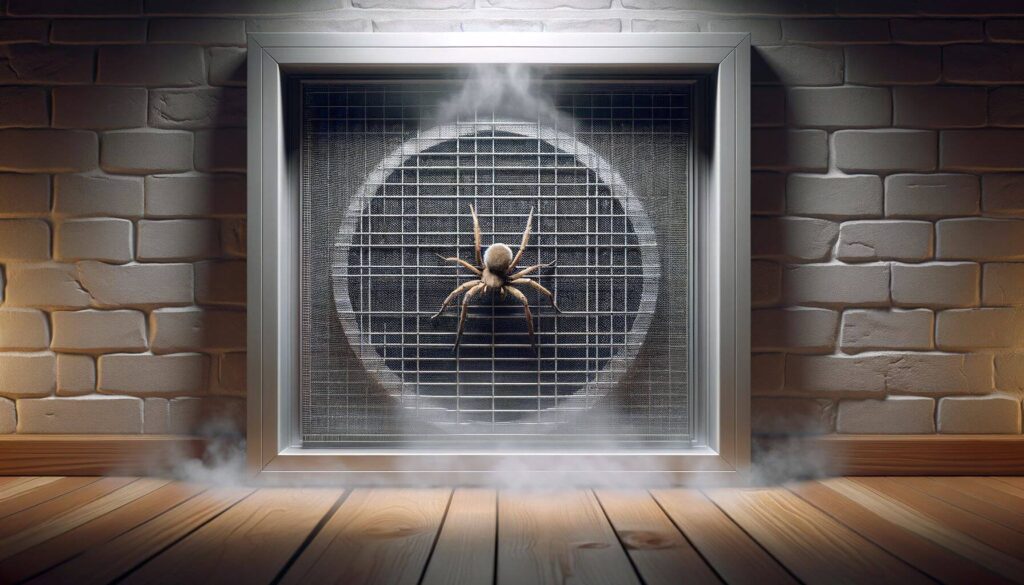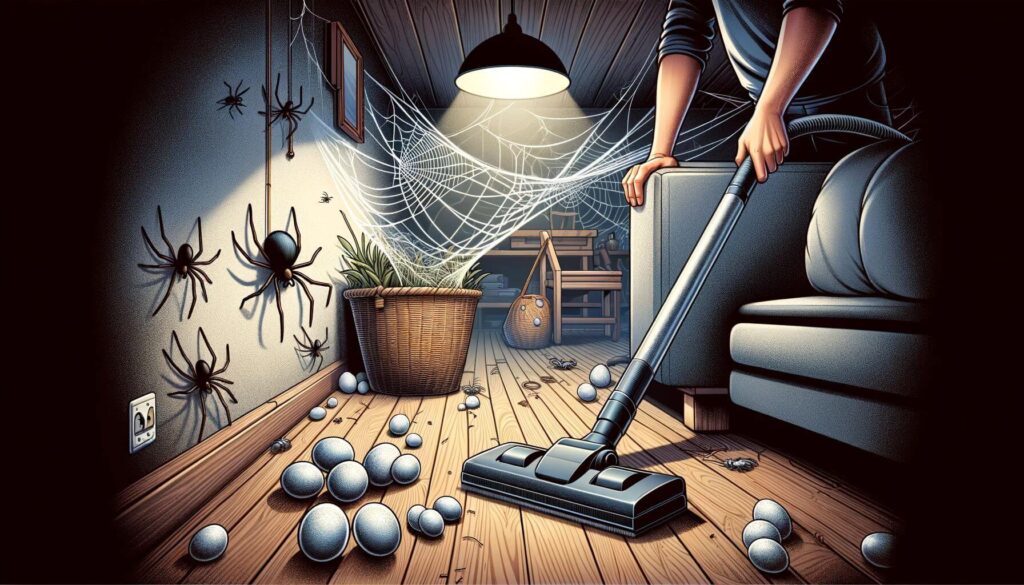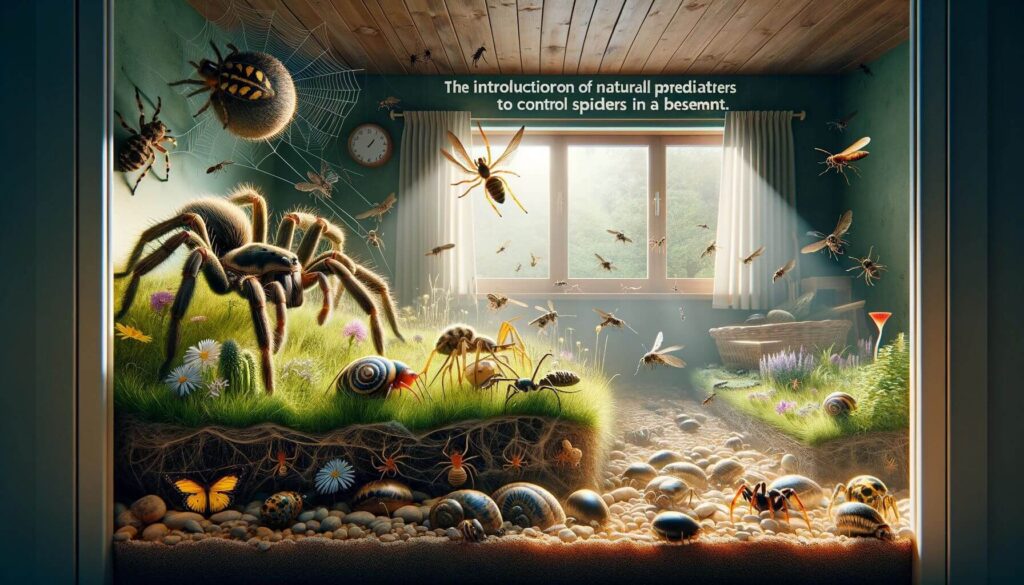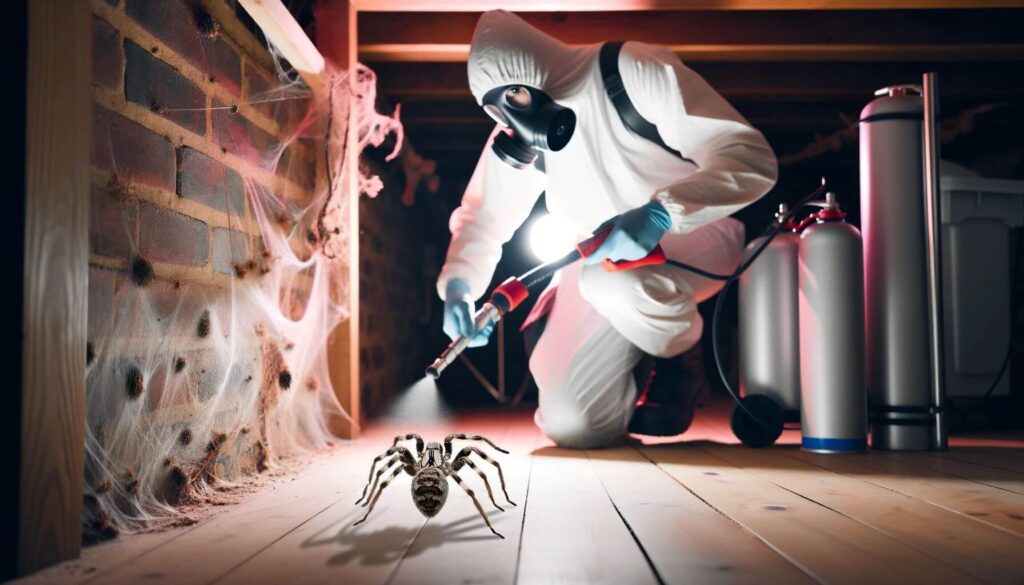
Spiders are a common sight in many homes, particularly in basements. This phenomenon is not just a coincidence but a result of specific conditions that make basements an ideal habitat for these eight-legged creatures. Basements, often being the lowest point in a home, tend to be cooler, darker, and more humid than other parts of the house. These conditions are attractive to spiders and the insects they prey on, making basements a prime location for them to settle in.
Moreover, basements are typically used less frequently by the household members, which provides a quiet and undisturbed environment for spiders to thrive. The presence of clutter, such as boxes, old furniture, and seldom-used items, offers an array of hiding spots for spiders, further encouraging their stay.
While spiders play a beneficial role in controlling other pests, their presence in large numbers can be unsettling and, in some rare cases, potentially harmful, especially if the species is venomous. For most homeowners, maintaining a spider-free basement is not just about alleviating fears or discomfort; it’s about ensuring a clean and safe environment. Spiders, their webs, and droppings can create a messy space, and in households with children, pets, or individuals with arachnophobia, it becomes even more crucial to manage and remove these arachnids effectively.
Therefore, understanding how to get rid of spiders in the basement is essential for homeowners who wish to maintain a home that is both comfortable and hygienic. We will discuss 25 effective ways on how to get rid of spiders in basement, ranging from simple preventative measures to more involved removal techniques. Each method aims to help you reclaim your basement from these unwelcome guests, ensuring your home remains a safe and welcoming space for all who live there.
Preventative Ways To Get Rid of Spiders
Preventative measures are crucial in controlling the spider population in your basement. By creating an environment that’s less attractive to spiders, you can significantly reduce their presence. Here are some key strategies:
1. Keep Your Basement Clean

The importance of reducing clutter could not be overemphasized. A cluttered basement provides numerous hiding spots for spiders and their prey. By keeping the area tidy and free of debris, you minimize these hiding places. Regularly organize and clean your basement, paying special attention to corners and behind furniture, where spiders are likely to build webs. Consider using storage solutions like shelving units and sealed containers to minimize clutter and reduce spider-friendly environments.
2. Seal Cracks and Openings

Spiders often enter basements through small cracks and openings in the foundation, windows, or doors. Conduct a thorough inspection of your basement for any potential entry points. Look for cracks in the walls, gaps around window frames, and openings around pipes or wires.
Use caulk to seal these cracks and openings. For larger gaps, consider using expandable foam or weather stripping. Ensuring your basement is well-sealed not only prevents spiders from entering but also improves energy efficiency.
3. Reduce Outdoor Lighting

Spiders are primarily drawn to areas where they can find food, and outdoor lighting can indirectly contribute to attracting them. Lights around your home can attract insects, which in turn attract spiders. Therefore, to reduce this, use motion-activated lights or yellow sodium vapor bulbs, which are less attractive to insects. Alternatively, consider positioning outdoor lights away from doors and windows, reducing the likelihood of insects and spiders being drawn into your basement.
4. Maintain Lower Humidity Levels

Spiders basement are attracted to moist environments, as these conditions are ideal for both them and their prey. Basements often have higher humidity levels, which can be reduced by using a dehumidifier. A dehumidifier will help maintain a dryer atmosphere, making it less appealing for spiders and the insects they feed on.
Moreover, regularly emptying the dehumidifier and keeping it clean ensures it operates efficiently. Additionally, fixing any leaks or dampness issues in the basement will also contribute to lower humidity levels, further deterring spiders.
5. Install Window Screens

If your basement has windows, ensure they are fitted with screens to prevent spiders from entering. Check existing screens for any tears or gaps and repair or replace them as needed. Screens should fit snugly and be free of holes. This simple measure can be highly effective in keeping spiders out, especially during warmer months when windows are frequently opened for ventilation.
6. Limit Food Sources

Since spiders feed on insects, reducing the insect population in your basement will make it less attractive to spiders. Keep your basement clean and free of food crumbs or spills that can attract insects. Use insect repellents or traps to control the insect population.
Thus, regularly inspect for and remove any stagnant water or moist areas where insects might breed. By maintaining an environment that is inhospitable to their food sources, you indirectly make your basement less inviting to spiders.
7. Store Items in Sealed Containers

Cardboard boxes are a favorite spot for spiders due to their dark and often undisturbed nature. To prevent spiders from settling in, store items in plastic bins with tight-fitting lids. Plastic bins are less attractive to spiders and also prevent them from getting inside. Additionally, these bins protect your belongings from moisture and dust, making them a more suitable storage option for basements.
8. Keep the Basement Well Lit

Spiders often prefer dark, secluded areas. By keeping your basement well-lit, you make it less inviting for these creatures. Consider using brighter bulbs and adding additional lighting in darker corners or areas of the basement. Adequate lighting not only how to deter spiders but also helps you spot webs and spiders during regular inspections.
9. Block Vents with Screens

Vents are another common entry point for spiders. To prevent them from coming in through these passages, install fine mesh screens over vents. Ensure that these screens are properly secured and check them regularly for any damage or gaps. This not only blocks access for spiders but also for other small pests.
10. Regular Inspection
Regular inspections are key to early detection and control of spider infestations. Check your basement thoroughly at least once a month. Look for signs of spiders such as webs, egg sacs, or the spiders themselves.
Pay special attention to less frequented areas and corners. If you find spiders or signs of their presence, take immediate action to remove them and clean the area. So you should inspect regularly to identify potential entry points or conditions conducive to spider infestations, allowing you to take proactive measures.
How To Keep Spiders Out Of Basement Naturally
Natural remedies can also be an effective and eco-friendly way to deter spiders from your basement. Here are some of the best spider repellent for basement you can try:
11. Use Essential Oils To Get Rid Of Spiders

Many essential oils are known to repel spiders due to their strong scents. Peppermint, tea tree, lavender, and citrus oils are particularly effective. You can create a spider repellent spray by mixing a few drops of essential oil with water and a small amount of dish soap (to help disperse the oil) in a spray bottle. Spray this solution around windows, doorways, and other areas where spiders may enter or congregate. Reapply the solution every few days for the best results.
12. Apply Diatomaceous Earth

Diatomaceous earth (DE) is a powder made from the fossilized remains of tiny aquatic organisms called diatoms. The microscopic sharp edges of DE can cut through the exoskeletons of spiders, causing them to dehydrate and die. To use, sprinkle a thin layer of food-grade diatomaceous earth around the perimeter of your basement and in areas where spiders are frequently seen. Be sure to use food-grade DE and not the type used for pool filtration. Since DE can be harmful if inhaled in large quantities, wear a mask when applying it and keep it away from areas where pets and children might come into contact with it.
13. Use Vinegar Solution

Vinegar is another effective natural spider repellent for indoors. Spiders dislike the strong smell of vinegar, which makes it an excellent deterrent. Mix equal parts white vinegar and water in a spray bottle. Spray this mixture in corners, along windowsills, and in other areas where spiders are present. Be cautious when using vinegar on surfaces that can be damaged by acidity, such as marble or certain metals. Reapply the solution regularly for ongoing spider control.
14. How To Get Rid Of Spiders In Basement By Planting Eucalyptus

Eucalyptus is known for its strong, menthol-like fragrance, which is pleasant to humans but repulsive to spiders. Planting eucalyptus in your home or placing branches or leaves in your basement can help keep spiders away. You can also use eucalyptus essential oil as mentioned earlier. The plant’s natural aroma acts as an effective spider deterrent while also providing a refreshing scent to your space.
15. Use Cedar Mulch

Cedar is another natural spider repellent due to its distinct aroma. Placing cedar mulch around the exterior of your home can prevent spiders from entering. Inside, cedar blocks or chips can be placed in corners of the basement or near windows to keep spiders at bay. Cedar is also effective against other pests like moths and can help in maintaining a pest-free basement.
16. Use Chestnuts

Chestnuts have been traditionally used as a natural way to repel spiders. Their scent is believed to be disagreeable to spiders, although the exact reason why chestnuts are effective is not well understood. Place chestnuts along windowsills, in corners, and near doorways in your basement. To keep spiders out of your basement, make sure to replace chestnuts with fresh ones periodically, as their effectiveness may diminish over time.
17. Use Citrus Peels

Spiders are known to dislike the scent of citrus. You can use this to your advantage by placing citrus peels around your basement. Lemon, orange, or grapefruit peels can be strategically placed in areas where spiders are commonly seen, such as windowsills, corners, and near doorways. Remember to replace the peels once they dry out to maintain their effectiveness. This method not only helps in repelling spiders but also leaves a fresh, pleasant scent in your basement.
18. Sprinkle Baking Soda

Baking soda is another simple yet effective solution for getting rid of spiders in basement. Though not toxic to them, its texture and smell are unpleasant to spiders. Sprinkle baking soda in areas where spiders are frequent visitors. You can also use it along the perimeter of your basement walls and near potential entry points. This inexpensive household item is a great non-toxic option to keeping spiders out of basement.
19. Grow Spider-Repelling Plants
Certain plants are known for their spider-repelling properties due to their strong scents that spiders find offensive.

These include:
Lavender: Known for its soothing aroma, which is disliked by spiders.
Mint: Its strong scent is a natural spider repellent.
Lemongrass: Contains citronella, which is commonly used in insect repellents.
Chrysanthemums: Known to repel spiders and several other pests.
Basil: Its strong scent keeps spiders away effectively.
Planting these around your home or placing them in pots in your basement can help keep the area spider-free. Not only do these plants are natural spider repellent, but they also add greenery and fresh scents to your home.
Practical Tools and Solutions To Get Rid of Spiders in House
In addition to preventative measures and natural remedies, there are practical tools and solutions that can be employed to control and eliminate spiders in your house.
Here are a couple of effective methods:
20. Vacuum Regularly

Regular vacuuming is one of the most effective ways to remove spiders, their webs, and egg sacs from your basement. This not only gets rid of existing spiders but also prevents future generations from taking over. Focus on corners, behind furniture, and other less-disturbed areas where spiders are likely to build their webs.
For the best results, use a vacuum cleaner with a hose attachment to reach difficult spots. After vacuuming, make sure to immediately empty the vacuum bag or canister outside your home to prevent any captured spiders from escaping back into your basement.
21. Use Spider Traps

Spider traps are a simple and non-toxic way to catch spiders. These traps typically use a sticky surface to trap spiders as they walk across them. There are various types of spider traps available, including glue traps and box traps. Place these traps in areas where spiders in basement are commonly seen, such as along walls, in corners, and near potential entry points. Check and replace these traps regularly to maintain their effectiveness. While traps won’t eliminate a spider problem on their own, they can significantly reduce the population and are a useful tool in conjunction with other methods.
22. Remove Webs Promptly

Regularly removing spider webs is a crucial step in controlling the spider population in your basement. Webs not only trap insects, which are food for spiders, but also signal to other spiders that the area is a good place to live. Use a broom, a vacuum cleaner with a hose attachment, or a long-handled duster to remove webs from corners, ceilings, and other hard-to-reach places. Make web removal a part of your regular cleaning routine, doing a thorough sweep of the basement at least once a week. This practice will get rid of spider webs and discourages them from resettling in the same spots. In return this method will help keep the area clean and tidy.
23. Use Spider Repellent Sprays

For an extra layer of protection, consider using commercial spider repellent sprays. These products often contain ingredients that are designed to repel or kill spiders on contact. When selecting a spray, look for options that are safe for indoor use and are non-toxic to pets and humans if that’s a concern in your household. Follow the manufacturer’s instructions carefully for safe and effective use. Thus, spray in common spider areas, such as along walls, in corners, and near entry points. Be sure to reapply the spray according to the product’s guidelines to maintain its effectiveness.
24. Introduce Natural Predators

One natural way to control the spider population is by encouraging the presence of their natural predators in your environment. This includes creatures such as certain types of wasps, birds, and even other spiders like the non-venomous house spider. However, this method requires a delicate balance as you don’t want to introduce a new pest problem. Attracting beneficial insects or birds that feed on spiders can be done by creating a garden-friendly environment outside. Inside, it’s often best to leave non-harmful spiders alone as they can help control the population of more problematic species.
25. Professional Pest Control

While the methods described can be effective in managing a spider problem, there are times when it’s best to call in professional pest control. This is particularly true in cases of severe infestation, if you find venomous spiders, or if you have a recurring spider problem that home remedies can’t seem to solve. Professional pest control services can offer more powerful solutions and can help identify and seal entry points to prevent future infestations. They can also provide peace of mind by ensuring that the problem is handled safely and effectively.
Finally How To Keep Spiders Out Of Your Basement
In our journey to reclaim the basement from unwelcome eight-legged guests, we’ve explored a variety of methods to deter, eliminate or keep spiders out of basement. From simple housekeeping tasks like regular cleaning and decluttering, sealing entry points, and maintaining a well-lit and dry environment, to natural spiders deterrents like essential oils, vinegar solutions, and spider-repellent plants. We also covered practical tools like vacuuming, using traps and sprays, and even introducing natural predators. And, when the situation calls for it, we’ve acknowledged the importance of professional pest control services.
The key takeaway is that consistent and regular maintenance is paramount for lasting results. By integrating these methods into your routine, you can significantly reduce and even prevent spider infestations in your basement. Remember, a multi-faceted approach is often the most effective. Combine preventative measures with natural remedies and practical solutions to create a comprehensive spider control strategy.



